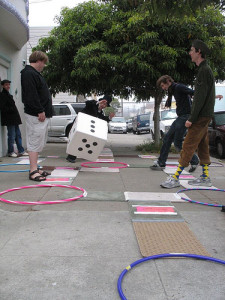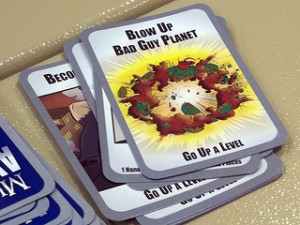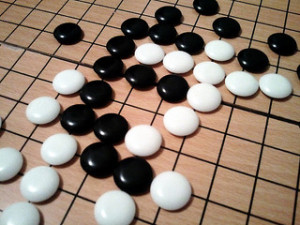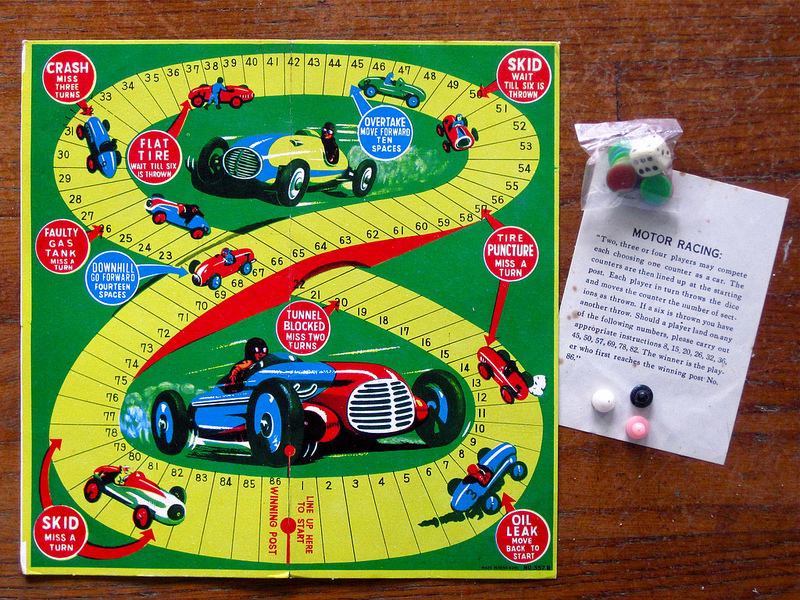It only takes one quick glance at your friend’s game closet to realize that we all have very different ideas about what constitutes a “great” board game. With more and more games finding their way into stores each passing month, it can sometimes feel as if the market is overrun. It is becoming increasingly difficult to separate the great games from the . . . well, the not-so-great.
Of course, a large portion of this is left to personal taste. Individual differences aside, though, I’d like to examine the five qualities that all great board games share.
1. Involvement
 Great games never let you get bored, and they can accomplish this in several ways.
Great games never let you get bored, and they can accomplish this in several ways.
The most obvious one is the simultaneous action mechanic, which evolved as a sort of intermediate between party games and normal tabletops. If all players are taking their turns at the same time, there’s no downtime while you wait for another player to act. This type of gameplay can be chaotic, but it’s engaging, demands your constant attention, and doesn’t allow you time to lose your focus. Similarly, games with very quick turns, like some playthroughs of Dominion, keep you involved by speeding through the action.
Other games give you so much to think about that you have to spend much of your downtime puzzling out your next move. Many traditional Euro games fall into this category. The turns may be slow, but you need all that time work out your best strategy. These games can be difficult for novice players or non-gamers because they demand a moderate to high level of concentration and tactical know-how. If players do not buy-in or are not interested, this type of heavy game will not keep their interest. However, for players who are able to get through the learning curve, these slower, more strategic games can be highly rewarding.
Whether a game keeps interest through simultaneous quick action or heavy strategic options is ultimately less important than the simple fact that it holds the player’s interest. Games that keep players involved keep players coming back to the table, and that’s as good a mark of a great game as we’re likely to find.
2. Intuitive Gameplay
Some games are clunky and, even after a few plays, you never know what you’re supposed to be doing next. It just doesn’t come naturally; it doesn’t flow. Great games, on the other hand, move seamlessly from one action to the next. Though the rules might be a little long, they are well-defined and logical. While playing, you never feel like you have to engage in any unnecessary steps.
 Of course, some games are complex enough that the first few sessions are anything but smooth. This is, for example, why you often have to add at least thirty minutes to an anticipated game length for every new player.
Of course, some games are complex enough that the first few sessions are anything but smooth. This is, for example, why you often have to add at least thirty minutes to an anticipated game length for every new player.
However, once you get the hang of the game, your turns should start to feel more natural. If you need to print out extra player guides or continually reference the rule book every round, the game could probably use a tweak or two.
Intuitive gameplay is important because it allows players to feel comfortable as they progress through the game. It’s only with this basic comfort level that players can have fun, test new strategies, and hone their skills.
3. Meaningful Decisions
 Nobody wants to waste time, least of all their own leisure time. Therefore, a game should never make players feel like their time would be better spent elsewhere – which can happen easily if the game does not offer any meaningful decisions. This is a variation on the classic gaming debate between luck and skill. How much luck is too much? How much skill is boring?
Nobody wants to waste time, least of all their own leisure time. Therefore, a game should never make players feel like their time would be better spent elsewhere – which can happen easily if the game does not offer any meaningful decisions. This is a variation on the classic gaming debate between luck and skill. How much luck is too much? How much skill is boring?
Some games rest on the extremes of the luck/skill spectrum (Snakes & Ladders is nothing but luck, while chess relies entirely on skill), but most fall somewhere in between. Games that rely too much on luck take away the player’s ability to influence their own position in the game. It’s very easy to become disengaged when you have little or no say in the outcome of your turn. This is why many traditional children’s games, such as Sorry!, are so boring when replayed as adults.
Though it is far less common, games can also take away a player’s ability to make a meaningful decision when there are simply too many choices available. If players are charged with deciding every aspect of gameplay, their decisions can become so watered down that they are essentially meaningless. Similarly, when there are no superior or inferior decisions, tactics and strategy cease to be a determining factor in the score. This can lead to frustration on the part of more advanced players, while at the same time hurting a game’s chances of being played again.
4. Variety in Gameplay
Humans are naturally playful creatures. We all get bored with performing the same task over and over again. Great games keep us on our toes by switching things up and making sure that we aren’t caught in an infinite repetitive loop.
Above, we discussed what can happen when too much luck is worked into game mechanics, but without any luck at all, games can get very dull. If each playthrough is the same and you know exactly which steps to take to achieve victory, the thrill of winning wears off. Just like leaving everything up to luck, it can be difficult to stay engaged when you’re simply going through repetitive motions without much thought.
Some games, like chess, get past this hurdle through sheer complexity. While there is little-to-no luck involved in the actual game mechanics, there are so many potential choices that each game is different.
Most other games add elements of luck sparingly. Games like 7 Wonders blend strategy and luck so that the player feels in control of his or her actions, but they can still be caught off-guard by an unexpected card draw or dice roll.
Great games balance variety and strategy carefully, though the “perfect ratio” of each varies from gamer to gamer. I don’t mind a fair bit of luck in my games, but I have a friend who despises anything with dice. Regardless of your individual preferences, though, great games are able to be played and replayed without becoming stale.
5. Defined Purpose
 Aimless wandering can be fun when you’re out on the trails, but when you’re around the game table, it helps to know where you’re going. Great games have a well-defined sense of purpose: they let you know why you’re playing, how you’re playing, and how you’re able to win.
Aimless wandering can be fun when you’re out on the trails, but when you’re around the game table, it helps to know where you’re going. Great games have a well-defined sense of purpose: they let you know why you’re playing, how you’re playing, and how you’re able to win.
One of the first questions asked whenever a new board game hits the table is, “How do I win?” It’s one of the most important questions in gaming because only in choosing an endpoint can we determine the path to get there.
Without knowing that you gain points for each coin you have at the end of Small World, for instance, you would have difficulty determining your strategy and implementing your tactics. Games that end in player elimination are played very differently than games that end when a certain resource is depleted. Even in the case of party games, where the importance is on having fun over winning, there’s usually still some kind of goal.
You don’t want players trying to achieve the wrong objectives. With a defined purpose, players are able to focus, to make meaningful choices, and to strategize.
While no two gamers are going to have the same list of favorite games, there are some games that are commonly recognized as great examples of where this hobby is headed. These games balance luck with skill and manage to keep players easily engaged throughout. If it can do all that and then have people want to play it all over again, it’s very possible you could have a great game on your hands.
![]()
Erin Ryan is a regular contributor to the site. What are some of your great game choices? Feel free to share them with us over on our forums!
Photo Credits: Street Game by Sandwichgirl; Munchkin Axe Cop Cards by Moore Memorial Public Library; Go Board by Sean Welton; Racing Game by puuikibeach.

